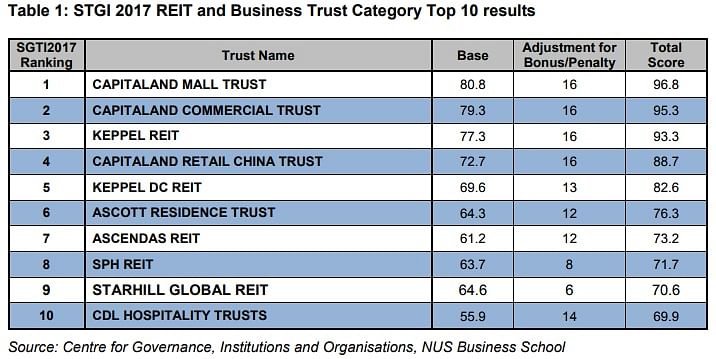SINGAPORE - Standards of corporate governance among Singapore-listed companies continued to improve, with average scores under the Singapore Governance and Transparency Index (SGTI) hitting an all-time high in 2017.
Singtel topped the annual SGTI ranking in the General Category, while CapitaLand Mall Trust led the new Reit and Business Trust Category.
This year's index ranked a total of 606 Singapore-listed companies and 42 Reits and business trusts that released their annual reports by May 31. The inclusion of Reits and business trusts reflects their growing importance in the local stock market.
The SGTI assesses companies on their corporate governance disclosure and practices, as well as the timeliness, accessibility and transparency of their financial results announcements. It is published annually by CPA Australia, NUS Business School's Centre for Governance, Institutions and Organisations (CGIO) and the Singapore Institute of Directors (SID).
In SGTI 2017, Singtel retained its pole position with 124 points, while CapitaLand moved up two spots to second place with a score of 118 points. Both companies saw notable improvement due to more comprehensive disclosures of board responsibilities and stakeholder engagement. DBS Group and Singapore Exchange tied for third place.
In the Reit and business trust category, Reits from CapitaLand and Keppel dominated the top five positions. CapitaLand Mall Trust topped its category with 96.8 points, with CapitaLand Commercial Trust and Keppel Reit following closely with 95.3 and 93.3 points respectively. Other best-performing Reits and Business Trusts include Ascendas Reit and SPH Reit.
Overall, the average score for companies in the General Category is 52.3, the highest on record. This is an improvement of 2.6 points from the 2016 average of 49.7, up from the 2.1 point increase between 2015 and 2016 when the SGTI was first introduced. Together with an average increase of 3.5 points per year observed between 2013 and 2017, this suggests that companies are making consistent improvements to their corporate governance disclosures and practices.

For the Reit and business trust category, the average score of 60.4 reflected solid performances in areas such as holding analyst briefings, the timely release of financial results announcements, and the competency of the Reit or trustee-manager by providing detailed profiles of their senior management.
Said Melvin Yong, Singapore country head at CPA Australia: "Singapore-listed companies have continued to raise the bar on corporate governance and transparency. But the journey for even higher standards does not stop here given the fast-changing and disruptive business landscape.
"Apart from compliance with regulations and standards, it is critical that leaders and directors of corporations have the strength, knowledge and flexibility to provide the moral compass for companies to function and excel."
Overall, companies were more transparent with their board and individual director assessments while their board competencies were also better maintained or improved:
This year's index also showed companies paying more attention to potential conflicts of interest and taking steps to handle them appropriately. Nearly six out of 10 (58.4 per cent) companies now have a policy on directors recusing themselves from board discussions if there is a conflict of interest, up from 39.1 per cent in 2016. A slightly higher proportion (62.5 per cent) of companies disclosed that their interested party transactions (IPTs) were conducted fairly and at arm's length, an increase from the 52.1 per cent in 2016.
But improvements are still needed in stakeholder engagement and investor relations. Overall disclosure on stakeholder engagement continues to remain low. Only 8.7 per cent of companies disclosed their anti-corruption programmes and procedures, a decrease from the 12.2 per cent in 2016. Disclosure of relevant data on training and development programmes undergone by employees was also at 10.6 per cent, down from 12.5 per cent in 2016.
Nevertheless, there was an improvement in areas such as having an anonymous whistleblowing policy in place for 49.8 per cent of companies assessed, an increase from 33.1 per cent in 2016.
Companies were also found to be lacking in reaching out to the investor community. Only 33.5 per cent of companies disclosed the steps they had taken to solicit and understand the views of their shareholders, a deterioration from 42.9 per cent last year. Furthermore, investor relations teams were also less responsive to queries as timely responses declined from 23.0 per cent in 2016 to 11.9 per cent in 2017.
Among Reits and business trusts, there is room for improvement in the disclosure of fees, with only 23.8 per cent of Reits and business trusts providing a benchmark for their performance fees.
Associate Professor Lawrence Loh, Director of CGIO, NUS Business School, said: "For the first time, Singapore's broad barometer of corporate governance assesses all key sectors including Reits and business trusts. The overall Singapore Governance and Transparency Index findings, particularly in the areas of improvements, will be useful for the ongoing review of our Code of Corporate Governance."



